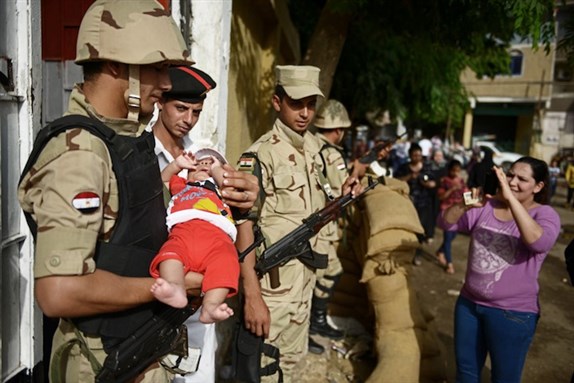[Text by Sinan Antoon, photos by Andy Spyra from November 2014 and March 2015.]
The fall of Mosul and other towns on the Nineveh plain in northern Iraq to ISIS this past summer was a monumental tragedy. It forced hundreds of thousands of Iraqis to flee their homes. Iraqi Christians, together with Yazidis and Shi‘a, and even Sunnis who opposed ISIS were priority targets. The number of Christian Mosulites was estimated at sixty thousand back in 2003. It was much higher in previous decades. But dictatorship, the devastating UN/US economic sanctions imposed on Iraq between 1990 and 2003, and the sectarian militia violence of post 2003 had whittled down their numbers and forced many to leave Iraq. Others fled to Iraqi Kurdistan in recent years. The towns on the Nineveh plains north and east of Mosul, predominantly inhabited by Iraqi Christians, fell to ISIS as well. Their inhabitants, some of whom had fled the sectarian violence in Baghdad in recent years, were displaced once again. This catastrophe was one final proof that the corrupt and sectarian Iraqi regime was incapable of, if not altogether unwilling, to protect its citizens. According to the United Nations High Commissioner for Refugees (UNHCR), the total number of Iraqis who were internally displaced in the second half of 2014 because of ISIS was one million.
The Iraqi regime’s response has been sloppy at best. It took months to come up with a plan and to start launching a counterattack to regain the territory ISIS had occupied. But the configuration of forces spearheading the liberation efforts says a great deal about the weakness of the state and the strength of sectarian institutions and logic. Rather than leading and spearheading the attack against ISIS, the Iraqi army has taken a secondary role to the Popular Mobilization Units (al-Hashd al-Sha`bi), which include volunteers fighting under the banners of sectarian militias.
Abandoned and desperate in refugee camps and other makeshift shelters, hundreds of Iraqi Christian men joined several exclusively Christian militias, many of which are termed Assyrian (a term that has been increasingly used in recent times to pigeonhole all Christians in Iraq) to protect fellow Christians and fight ISIS in order to liberate their towns. Some of these militias cooperate with the Kurdish Peshmerga forces. Others receive donations from Iraqi Assyrians in the diaspora, as well as weapons and ammunition from the Kurdish Democratic Party (KDP). Such is the case of Dwekh Nawsha (see images) which also boasts a few British and American foreign volunteers.
Irrespective of individual intentions and objectives, and short-term goals, the institutionalization and proliferation of sectarian militias, be they Christian, Assyrian, Shi‘i, or what have you, will not protect the lives and rights of citizens of those sects. It will only exacerbate the divisions, lead to further fragmentation, and embolden sectarian parties and politicians who brought about this catastrophe in the first place. Militias, as well as their politics and culture, will make a stable and safe Iraq an impossibility.
![[The Dwekh Nawsha militia on the road to the front line in the Nineveh plain, north of Mosul, Iraq. It is the armed wing of the Assyrian Patriotic Party formed to protect Christian villages. It fights alongside Peshmerga forces against ISIS. As of November 2014, the militia had forty fighters, with about two hundred volunteers waiting to join. Photo by Andy Spyra.]](https://kms.jadaliyya.com/Images/357x383xo/Dwekh_Nawsha_Iraq_017.jpg)















